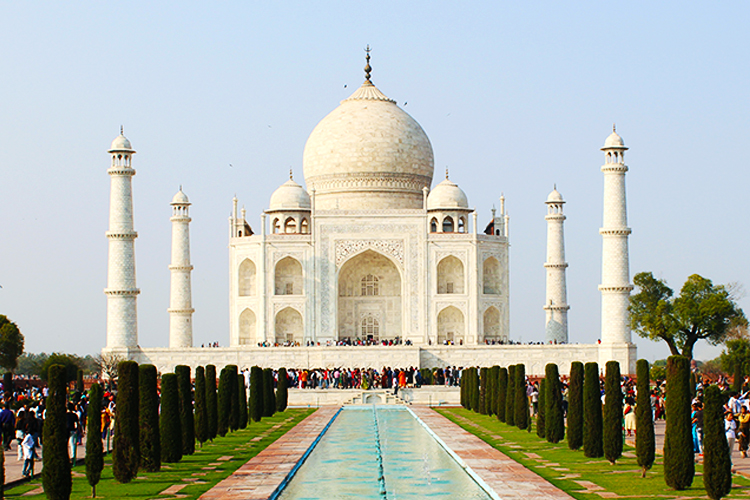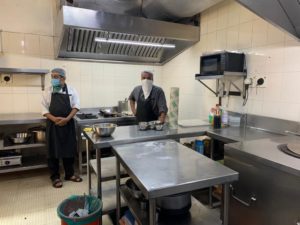The corona blow to the tourism industry

It would be a while before even the Taj Mahal, the most popular tourism site in the country will start attracting tourists
One of the largest sectors of Indian economy, tourism, lies in tatters due to the pandemic and the lockdown, while the government turns a blind eye, putting tens of millions of jobs at risk.
Atithi devo bhava, translated to Guest is God, is the traditional Indian saying usually adopted by the hospitality industry in the country. However, with the coronavirus pandemic, it seems that the industry would end up waiting for the God-like guest for several months, if not an entire year, leaving the entire sector reeling under the worst-ever crisis.
Though the data is not comprehensive, tourism industry accounts for USD 247 billion or nearly 10 pc of India’s GDP and employs over 55 million persons, across the entire spectrum of hotels, transport, restaurants, entertainment and souvenirs. While there are scores of large companies involved in the business – running hotels, tour operators and transport providers, the tourism industry is hopelessly fragmented with an overwhelming majority of the business being done by small and medium enterprises.
This fragmented nature has come to haunt the industry as it faces the pandemic. The first jolt came in the form of closure of Indian airports to international flights on March 22. Even though the inbound tourism season starts to fade out in March, there is a fair bit of traffic in form of groups as well as conferences and of course business travel that continues through the year. Moreover, it came just a fortnight before the start the even more lucrative outbound travel season. Just for comparison, India received just over 11 million foreign tourists last year, while nearly 25 million Indians travelled overseas in the same period. Also, the domestic travel season was all set to start as school and college examinations were underway. Domestic travel is indeed the big dad of the entire business, with estimates of domestic travel ranging from a credible 100 million to a ridiculous 800 million persons.
With all activities frozen, immediately and without any clarity on the duration, the industry collapsed almost immediately. According to industry experts, the pandemic would have a debilitating impact on India’s tourism sector. “The Indian tourism and hospitality industry is staring at a potential job loss of around 38 million, which is 70 pc of the total workforce,” due to Covid-19, a report by KPMG, a financial services and business advisory firm, said.
Even though the tourism sector all over the country has been impacted but the hardest hit are those states whose economy depends mainly upon tourism. States like Goa, Pondicherry, Sikkim and Kerala are among the hardest hit. Even though Sikkim has zero cases of Covid-19 cases, the state is completely under lockdown. Similarly Goa and Kerala that have recovered from the pandemic will only resume tourism once the situation is completely under control in the country.
Intermediaries of tourism industry like tour operators and travel agents are amongst the hardest hit by the lockdown, with many staring at bankruptcy, even though some are trying to keep the chin up even as their business takes a beating that few can handle. “We were impacted even before the lockdown began. We are an inbound tour operator. Our business started getting affected since the mid of January and by the end of February we almost had zero business. Even before lockdown we were impacted and from March 15 we have been closed. We don’t see any business coming till September 2021. Normally the inbound tourism in India starts from September/October. So if you start calculating from September 2020 to March 2021 that full year is gone,” S Mahalingaiah, director of Skyway International Travel, tells Media India Group.
The Bengaluru-based travel company specialises in organising customised tours of south India for overseas tourists. It also caters to domestic tourists and Mahalingaiah feels that the domestic tourism may begin within the next couple of months. “Even if they lift the lockdown in May people will not start travelling till June and July. We are hoping that domestic tourism will see a marginal growth during the October- November, that is the Dussehra period when people will start making plans again and this will bring minimum 20-30 pc of business. So we are hoping that from October onwards we can take some breath,” he says.
“We predominantly promote South India and we are hoping Karnataka will bounce back to attract more domestic tourist. Since Karnataka is a big IT hub and soon the sector will get back on track. We are hoping to encourage people to travel at least on weekends. Karnataka gets business from Maharashtra, Gujarat and Delhi area. We might see more demand in ayurveda packages, health etc. And also experience. People might not want to travel to too many places and would want to go and relax in one destination and rejuvenate and also see some local experiences, that is what we are looking at,” Mahalingaiah says.
For many overseas guests of Skyway Travel, Puducherry, the former French colony is an unmissable destination as the tiny union territory has retained the essence of French culture, with its unique melange with the local Tamil traditions. Tourism is the mainstay of Puducherry’s economy and the territory has been suffering tremendously by the lockdown as hundreds of hotels, guest houses and restaurants have shut down, threatening jobs of hundreds of thousands of people. Reports suggest that already many smaller, boutique hotels have shut down and retrenched thousands of people, most of who belong to the neighbouring Tamil Nadu state. However, not every hotelier is packing the staff off. Segiyane Paquiry, a French national of Indian origin, runs two boutique luxury hotels in Puducherry. Both his hotels have been bereft of guests for over a month, but he has allowed his staff to stay on, especially those come from faraway places. He says while he has not sacked any of his 70-person team and does not plan to either, he is paying basic salaries to the staff and also clearing all dues including leave encashments. “As long as we don’t get what the government has been promising in terms of soft loans and other relief, we will have to be very cautious about our finances,” Paquiry tells Media India Group.
Paquiry says that as the number of cases of Covid19 is extremely low, seven on Saturday, the territory should open its borders with Tamil Nadu and Karnataka at the end of the lockdown in order to revive tourism in the state. “Then we can start getting the first flush of local Indian tourists, say the IT industry professionals from Bengaluru or Chennai, I am not talking of tourists from Mumbai or New Delhi. Talking of the foreign tourists, we expect them to start coming from September this year. I am expecting people of Indian origin who live in other countries or the business persons, they would be the first foreign tourists that I expect from September,” he says.

The staff of Villa Shanti, a luxury boutique hotel in Puducherry have been allowed to stay in the hotel and use its facilities in the absence of any guests following the lockdown
About 2,500 km north of Puducherry, up in the Himalayas, lies the picturesque state of Sikkim, another territory in the country that is heavily dependent upon tourism for its economy. The state’s 1100-odd hotels are normally packed to the seam at this time of the year, managing to generate over INR 2.2 billion in just three months of peak season traffic. However, this year, thanks to the pandemic not only have the hotels lost out on their peak season but many are facing imminent closure, even though Sikkim has not recorded a single case of covid19.
Temi Tea, a government-owned tea estate and the sole tea estate in the state, had recently renovated a few cottages on its land to promote tea tourism. Mrinalini Srivastava, the managing director, was looking forward to a packed house during the season. But, unfortunately, as things stand, not just Temi Tea, but the hospitality and tourism industry in the entire state is looking at a bleak future. For Temi Tea, it may still be okay as tourism is a minor, side-business, and at the company’s tea plantation regular activities are on. But Srivastava is apprehensive about the fate of the hotel and tourism industry in the state.
“Now we are not sure when things will be back to normal and when people will start travelling again. Sikkim has not registered a single case of covid19 positive case which makes it even more defensive in allowing people to go out or enter the state both for domestic as well as foreign tourists. It is a Catch 22 situation for the government. Similarly, the economy of Sikkim is based on rural tourism and homestays and these will not be able to survive,’’ Srivastava cautions.
She suggests that the state use the occasion of this crisis to rethink its entire tourism strategy. She says instead of allowing mass tourists, where the spend per person is very low and which brings its own costs in terms of pollution or pressure on the limited natural resources of the state, the state government should follow Bhutan government’s model and raise the bar for the tourism industry. “Perhaps, we should also fix a minimum amount that each tourist visiting Sikkim would have to spend per night,” she suggests.
Indeed tourism industry could change dramatically post-Covid19. Mahalingaiah of Skyway Travels feels that when tourism restarts, there would be a sharp spike in demand for wellness tourism. “We might see more demand for Ayurveda packages as well as experiential travel. People might not want to travel to too many places and would want to go and relax in one destination and rejuvenate and also see some local experiences, that is what we are looking at,” he says.
Another big change that could take place is the shift away from group travel, the mainstay of both inbound and outbound tourism.
“Group travel is going to take a long, long time to come back to normal. People will go for family travels first and group travel may take 1-2 years. Everybody is scared now. Till a vaccine is found, people will remain scared. Similarly, even if lockdown is lifted it will take a long time for hoteliers to recover. Hotels will need to assure the customers with proper hygiene. They will need to gear up themselves. Maybe 30-35 pc of the tour operators will be able to survive. Tourists will now take caution. They will not be willing to go on with any company,’’ he adds.
Dramatic changes are indeed coming in the tourism industry that it is hardly prepared for without proactive and immediate assistance from the government it may be reduced to a rubble by the end of the pandemic.









